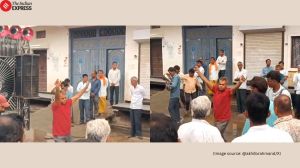Mystery fever spread in Panchkula is dengue, determine PGI experts
The team of doctors from PGI had taken more than 15 blood samples of patients from Panchkula who had been admitted to the hospital with high-grade fever and severe symptoms and complications like body ache, low platelet count, chills, nasal bleeding, urine and in severe cases hemorrhages.
 As per the details available, more than 40 patients have currently been admitted to the hospital with complaints of high fever and complications. (Representational/File)
As per the details available, more than 40 patients have currently been admitted to the hospital with complaints of high fever and complications. (Representational/File)The mystery illness that had seen scores of people being admitted to Panchkula Civil Hospital, Sector 6, in the past few days has been now decoded as dengue by a team of doctors from the Department of Community Medicine\Epidemiology, PGI, who had been roped in by local health authorities to give suggestions and inputs.
As per the details available, more than 40 patients have currently been admitted to the hospital with complaints of high fever and complications. Around 15 deaths, most of which have been reported from Pinjore and Kalka, have occurred due to the mystery illness in August and September (till date).
The team of doctors from PGI had taken more than 15 blood samples of patients from Panchkula who had been admitted to the hospital with high-grade fever and severe symptoms and complications like body ache, low platelet count, chills, nasal bleeding, urine and in severe cases hemorrhages.
Professor Arun Kumar Aggarwal, Head of the Department of Community Medicine, PGI said that officials from the health department of Haryana were asked to collect samples from some villages and clusters from where current cases of fever were being reported, along with conducting fever surveillance in the surrounding areas. “The samples were tested in PGI to establish the cause of the unexplained fevers, rapid deterioration, and why the deaths may have occurred. Almost all the samples tested indicated direct or indirect evidence of dengue,” Aggarwal said.
“This is conclusive and the initial findings of the Department of Virology, PGI, indicate Sero Type 2 dengue, which is a more serious strain than the other variants of the virus,” added Aggarwal.
Multiple organ involvement, dengue shock syndrome, hemorrhages in some cases, and severity in symptoms could be because of this strain. After the slide tests, added Aggarwal, the district administration was requested to swing into action, and anti-mosquito measures, checks, and issue of notices were started on a war footing.
The Panchkula district commissioner has ordered fogging and spray machines across the district to be used to tackle mosquito breeding, with panchayats, schools, teachers, and market associations involved to spread awareness regarding the prevention of dengue, and simple measures on also how to reduce mosquito breeding and personal awareness.
The National Health Team, on a visit to the affected areas of the district, has met senior doctors and taken updates on all the measures being taken to check dengue. According to Dr Murara, the team appreciated the department’s efforts to combat the recent rise in fever /dengue cases. At the same time, it stressed on the need for strengthening preventive measures.
“We have teams deployed across the district already to implement preventive measures as well as conduct awareness campaigns,” added Dr Murara. On Friday, at least 24 cases of dengue were reported and one dengue death was recorded from Khera Basolan, a village in the district.
Aggarwal said, “We have trained doctors on fever sensitisation, fever management, and how to reduce complications and fatality. There were also sessions by our doctors to not ignore any symptom, for it could lead to dengue shock syndrome. We have to be alert to every symptom, be it a pain in the abdomen, body ache, weakness, nausea, fall in platelet without fever, reduced pulse pressure, malaise. Fever is not the first symptom, sometimes fever may not even be recordable. Patients must be referred to health facilities immediately and be tested for dengue and there should be no delay in treatment. Plenty of fluids must be given, to avoid deterioration of health.”












